
The roiled rollout of Machu Picchu virtual ticket platform
[Originally published December 21, 2023] A controversy is brewing in Peru regarding ticket sales for Machu Picchu. The Peruvian Ministry of Culture announced a couple of months ago that it was contracting a Lima-based company called Joinnus for the 100% virtual sale of Machu Picchu tickets.
The decision has sparked debate, protests and general concern about Peru’s handling of its Cultural Patrimony sites.
In 2022, a very misguided ex-minister of culture implemented a new system for Machu Picchu ticket sales.
She worked for a now-jailed ex-president who ran on “non-profit” hyper-local tourism and entirely eschewed the desirability of attracting international visitors to Peru.
She opened up 1,000 tickets per day for purchase directly at a box office in Aguas Calientes. The results were disastrous.
Throughout this past year, Aguas Calientes has been the scene of chaotic lines of tourists anticipating same-day entry tickets, only to be met with “Sold Out” signs. Accounting for the money received for tickets is lacking. Scalping of counterfeit entry tickets suddenly became a problem for the first time.
Meanwhile, as that chaos played out in the town below, visitors up in Machu Picchu who obtained their tickets in advance toured a relatively uncrowded Inca sanctuary.
In short, Peru is in desperate need to fix its broken ticketing system for Machu Picchu. Tickets should be sold securely online to restore order and ensure a better experience for visitors. It has fallen to the new Culture Minister Leslie Urteaga to fix the problems.
For decades, Machu Picchu has been one the world’s most controversial heritage sites, facing a fundamental paradox: Revenue from ticket sales, intended for preservation, actually pose a significant threat to its existence due to overexploitation.
Under pressure from UNESCO, Peru has produced three Master Plans to address this dilemma.
The last, most comprehensive Master Plan covered 2015-19, and promised to strike that critical balance between commercial access and sustainability of the Inca citadel. Then the Covid-19 pandemic, and its political aftermath, blew the plan apart.
So, what are the main issues right now?
Q: What is the proposal from the Ministry of Culture regarding Machu Picchu tickets and access?
A: The proposal is to have a single virtual platform where all the cultural and tourism offerings that the Ministry of Culture manages, including museums and archaeological sites, can be available for domestic and foreign visitors. This would provide information on ticket prices as well as information about the sites.
Q: What happened with the 2019 proposal to improve the ticketing system for cultural offerings managed by the Ministry of Culture?
A: In 2019, the Ministry proposed a public investment project to improve the ticketing system over three years at a cost of 54 million soles. However, the COVID-19 pandemic interrupted this project so now they have decided to contract an existing ticket platform from a private company.
Q: What are the main concerns about the Ministry of Culture’s contract with Joinnus for Machu Picchu ticketing?
A: The main issue is an exquisite lack of transparency. Despite some conflicting information that three companies competed for the job, it seems very clear now that the contract was awarded directly to one, Joinnus, without the proper public bidding process.
The Ministry argues the contract for S/.36,000 falls below the threshold to require bidding. But Joinnus’ 3.9 percent commission on ticket sales potentially amounts to around S/8 million annually in the first year.
This raises questions about the fairness and legality of the decision, especially given Joinnus was recently acquired by Credicorp Ltd., the largest financial services holding company in Peru.
And it is not just Machu Picchu. The plan is for the platform to handle ticketing for all of Peru’s public heritage sites and museums.
The ministry maintains that the arrangement with Joinnus is “temporary” — a year — while the Peruvian government works on reestablishing its own secure virtual ticket system for Machu Picchu, as well as sites and museums across the country.
But there are unanswered concerns about Joinnus gaining access to tourist data without clarity on data usage rights or the potential for cross-selling additional services with that huge personal information.
“We are not in agreement with monopolization and even less with acts that contravene the political constitution of the country.”
Hubert Quisocala, the secretary of the Technical Committee of the Machu Picchu Management Unit
Hubert Quisocala, the secretary of the Technical Committee of the Machu Picchu Management Unit, which works directly with UNESCO, said his office officially requested a copy of the Joinnus contract from the Ministry of Culture, “and until now, it has not been provided to us.”
Saúl Caipani, head of the Regional Management of Foreign Trade and Tourism (Gercetur), added to the criticism of the Culture Ministry. “Decisions have to be agreed with the entire sector,” he told daily newspaper El Comercio. “There is fear that these acts are part of a direct pre-privatization of Machu Picchu. We ask the Ministry of Culture to be clear and responsible in imparting the information.”
Q: How has the Ministry of Culture responded to protests over the Joinnus contract?
“I would like to know what labor rights we would be violating by moving from a platform that does not work, that has not had reinforcement lately, that does not have servers to support it, to one that is temporary as we have said but that will allow us to guarantee control, to provide better information on each circuit and to provide transparency.”
Peru Culture Minister Minister Leslie Urteaga
RPP Interview
A: The Ministry has stated over and over that it is “not privatizing Machu Picchu” and that the contract provides needed improvements to the broken ticketing system.
However, there is trouble internally as the Ministry’s Cusco regional director just resigned and the ranks of the Ministry of Culture’s Cusco offices are up in arms. Since 2004, they managed the old online system. This new system has been thrust upon them and threatens their jobs, they complain.
The launch of Machu Picchu tickets on Joinnus was supposed to be Dec. 20th, but was postponed amid protests and legal challenges. Urteaga told reporters that they are going to take “a few more days” to give authorities a chance to familiarize themselves with the new system, which she now says will roll out after New Years’.
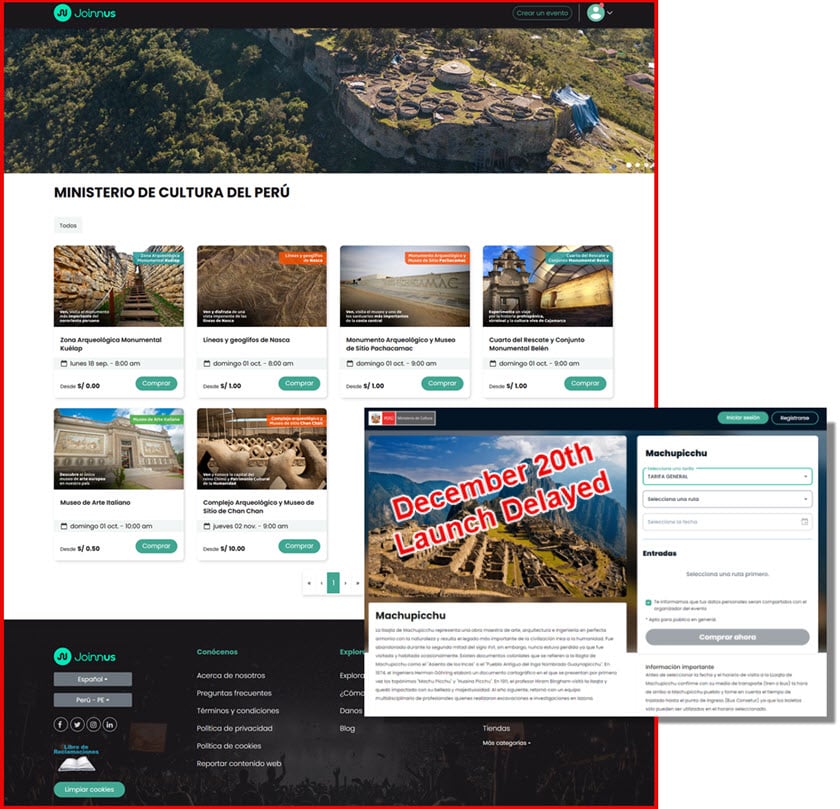
Q: What does Peru’s hospitality sector think about the Machu Picchu ticket controversy?
Some of the biggest players in Peru’s tourism sector, like the National Chamber of Tourism (CANATUR) support the contract with Joinnus.
Juan Stoessel, CEO of the Casa Andina hotel chain, and vice president of the Cusco Chamber of Tourism, is another proponent. He criticizes an entrenched old guard in Cusco that “want to maintain the status quo.”
“Everything is at a snail’s pace,” Stoessel said. “So we need the political will to move forward with the Machu Picchu Master Plan, new accesses, and an updated ticketing platform. But there are entrenched interests benefiting from and wanting to maintain the antiquated systems.”
Q: What does our little boutique travel operation think about the Joinnus controversy?
As difficult a year as 2023 has been, Fertur Peru Travel’s clients were thankfully among those visitors who toured Machu Picchu at a leisurely pace while chaos reigned on the ticket queues in the town below.
That stated, we undoubtedly had fewer clients this year because of the terrible headlines about problems at Machu Picchu.
We agree with Juan Stoessel that Peru needs to get back on track and proceed with the Master Plan for everyone’s benefit.
We are acutely uncomfortable, however, with the lack of transparency that led to Joinnus being tapped for the job as gatekeeper for Machu Picchu, and every other heritage site and public museum in the country.
Creditcorp is a financial Behemoth, whose portfolio includes Banco de Crédito del Peru, the country’s largest bank and biggest lender, and Yapé, a hugely popular digital wallet app that is fast supplanting debit cards and cash payments in everyday transactions.
We all can love the convenience and reliability that a Joinnus could provide for Machu Picchu. But there must be a clearly defined firewall to maintain the public administration of our shared patrimony.
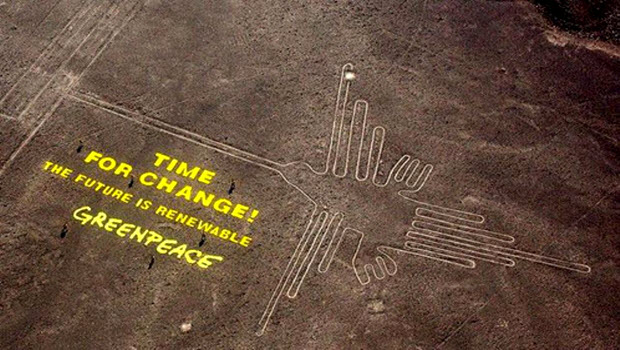 Greenpeace activists in hot water over Nasca Lines act
Greenpeace activists in hot water over Nasca Lines act  Mr. Monopoly Tours Lima in Search of Votes
Mr. Monopoly Tours Lima in Search of Votes  Arequipa tour attraction Juanita mummy placed in deep freeze
Arequipa tour attraction Juanita mummy placed in deep freeze 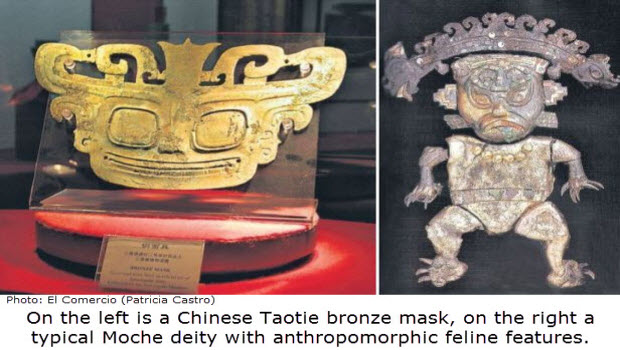 Ancient Link Between Chinese And Peruvian Civilizations?
Ancient Link Between Chinese And Peruvian Civilizations?  Nazca Lines archaeologist faces charges for TV tour
Nazca Lines archaeologist faces charges for TV tour 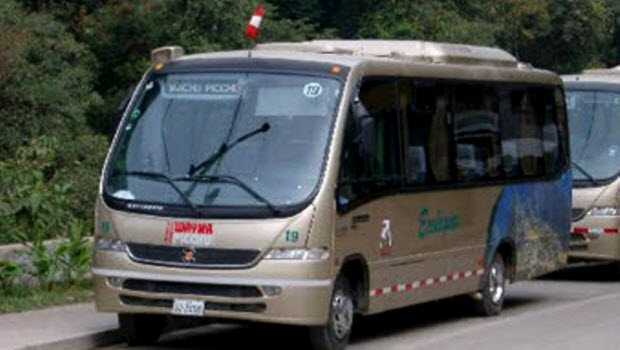 Bus ride up to Machu Picchu hiked, AGAIN!
Bus ride up to Machu Picchu hiked, AGAIN!  Make Arequipa a port of call on a luxury cruise vacation
Make Arequipa a port of call on a luxury cruise vacation 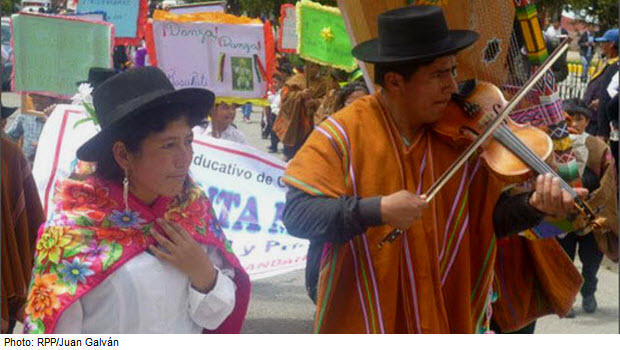 All Arts Festival underway in hommage to Arguedas
All Arts Festival underway in hommage to Arguedas